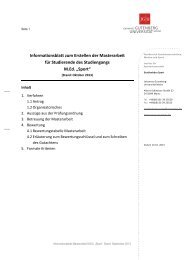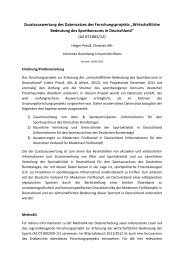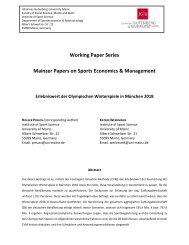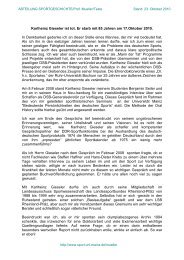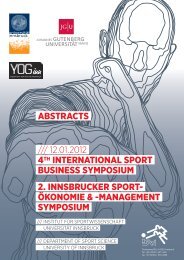Holger Preuss notes
Holger Preuss notes
Holger Preuss notes
Create successful ePaper yourself
Turn your PDF publications into a flip-book with our unique Google optimized e-Paper software.
Top: Most construction for the<br />
Games (as opposed to investment<br />
in infrastructure) is a necessary<br />
expense with little return. The IBC<br />
could be the exception to the rule.<br />
Middle: <strong>Holger</strong> <strong>Preuss</strong> with James<br />
Graham and Bob Lentell in Beiing.<br />
Bottom: The Olympic Green in<br />
Beijing<br />
The first is that the Games are used<br />
by politicians and stakeholders to create<br />
the momentum for major infrastructure<br />
projects. In our case it might be<br />
Crossrail or the DLR extension and<br />
expansion, for example. In Athens it was<br />
the Airport. In Beijing it was the<br />
Airport, the ring-road, underground lines<br />
and major environmental projects.<br />
Pressure from the population to<br />
host the Games, a lack of knowledge<br />
about what precisely is required by<br />
government, pressure from Organising<br />
committees and local stakeholders all<br />
add to the upward pressure on costs.<br />
<strong>Holger</strong> made the point that this<br />
infrastructure spend is not in the same<br />
category as the three to five billion<br />
Euros that are in effect, buying the one<br />
off ability to host the Games. These<br />
infrastructure investments have a much<br />
longer depreciation and are often where<br />
real benefit is derived from hosting the<br />
Games by boosting the infrastructure<br />
development of the city by ten years.<br />
<strong>Holger</strong> then looked in<br />
more detail at the drivers<br />
of genuine legacy from<br />
the Games.<br />
He noted that<br />
the injection of<br />
money from tourism<br />
and visitors to the<br />
Games leaves no<br />
noticeable impact two years<br />
post Games. In Germany it was<br />
estimated that the World Cup boosted<br />
the German gross domestic product by<br />
just 0.13%. The Games-time new money<br />
leaves no impact.<br />
The real benefit comes from:<br />
• Change of location factors<br />
• Signaling effect<br />
Change of location factors are<br />
these:<br />
Changing the image of the host city<br />
and nation. <strong>Holger</strong> noted that whilst<br />
London is a well known global city, that<br />
well known global brands have to<br />
continue to promote themselves in a<br />
highly competitive environment.<br />
[2]<br />
Paradoxically it is<br />
only the additional<br />
infrastructure spend that<br />
secures a positive<br />
legacy<br />
Changing emotions: pride and a feel<br />
good factor for people looking to live or<br />
work in the host city.<br />
Increasing know-how: not just in<br />
terms of how to stage a major event, but<br />
the knowledge gained by thousands of<br />
volunteers, specialist knowledge in areas<br />
such as security (for example Athens<br />
worked alongside the FBI and renewed<br />
their security infrastructure).<br />
Developing networks: The Games<br />
will attract world leaders into a nonpolitical<br />
environment. Business leaders<br />
can use the Games to broaden and<br />
deepen their networks in a conducive<br />
atmosphere. Sydney businesses built<br />
relationships they are still exploiting<br />
today.<br />
Culture and sport: The Games bring<br />
massive exposure of the host culture and<br />
renew and deepens appreciation of the<br />
cultural offer. Tourism boost in<br />
Barcelona was not because people<br />
wanted to wander through the old<br />
Olympic Park, but because people had a<br />
new view of Barcelona as a<br />
cultural destination with a<br />
beach. Barcelona spent<br />
money developing<br />
galleries and other<br />
cultural assets and it<br />
was these that now<br />
attract tourists and<br />
repeat visits.<br />
Infrastructure: The visible<br />
infrastructural changes, not only sport<br />
but also DLR, stations, parks, …<br />
Both Barcelona and Athens invested<br />
heavily in these location factors.<br />
This brought <strong>Holger</strong> to the nub of<br />
the dilemma. These infrastructure and<br />
location factors drive up costs of<br />
Olympic projects, and yet they are the<br />
investments that long term drive legacy<br />
benefit. The Games are a catalyst and an<br />
excuse that can justify this additional<br />
spend.



